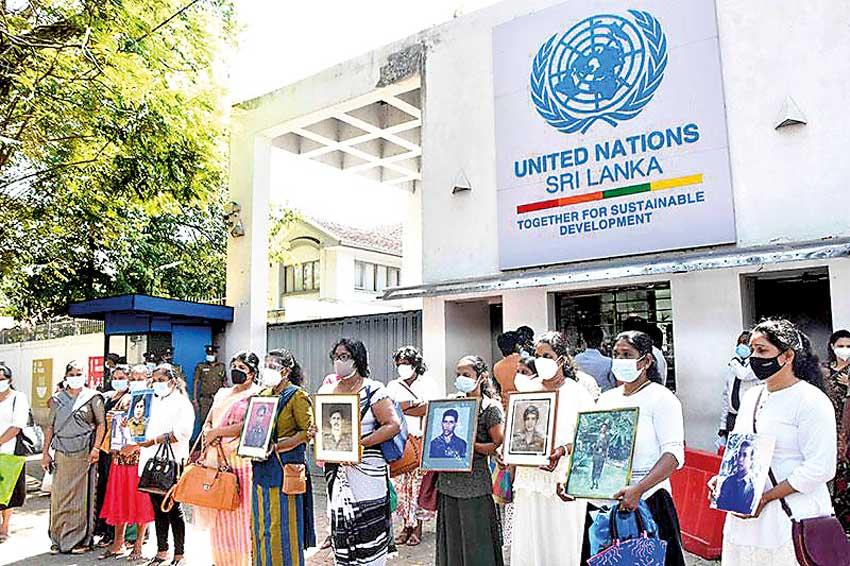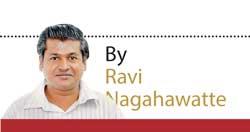Reply To:
Name - Reply Comment

Protest held in front of UN office
Another issue that’s still hotly spoken of is the saga of human rights worker and lawyer Hejaaz Hizbullah
But there were feelings of hopelessness among the Tamil people when an Army Sergeant convicted of eight murders was issued a presidential pardon.
 In February valentine’s day parties were canceled and people were told to remain at home. Sri Lanka also braces itself to face a new variant of the COVID-19 pandemic which is said to have originated in England and now present in this island nation. But Sri Lankans who have their ‘thinking caps on’ are living life low key. This is because of the upcoming UNHRC sessions in March which could put Sri Lanka in a spot of bother if resolutions are passed against it for alleged human rights violations.
In February valentine’s day parties were canceled and people were told to remain at home. Sri Lanka also braces itself to face a new variant of the COVID-19 pandemic which is said to have originated in England and now present in this island nation. But Sri Lankans who have their ‘thinking caps on’ are living life low key. This is because of the upcoming UNHRC sessions in March which could put Sri Lanka in a spot of bother if resolutions are passed against it for alleged human rights violations.
Sri Lanka is on the back foot for many reasons. One is that there is growing dissent from the minorities because there is an effort by the regime to militarise state establishments and reduce the space for protest and disapproval.
The Government of Sri Lanka (GoSL) fights the UNHRC stance on Sri Lanka’s alleged human rights violations and at the same time wants to be part of this convention. It also wants to maintain cordial relationships with the rest of the world and be part of the international community; conveniently disregarding the condemnation aimed at them by the outside world for alleged war crimes and human rights violations. If the resolution against Sri Lanka is successfully backed by its detractors in Geneva the islanders may have to bear the brunt of travel bans, the freeze of assets and references made of those who violated human rights to an international criminal court. This would not be a pleasant wicket to be on especially when the country is struggling to service huge loan commitments and wobbling because of a fragile economy.
The Government and its supporters are a funny bunch of people. Some time back there were mounting protests against the call by Muslims to allow them to burry their loved ones who succumbed to COVID-19. But now after Premier Mahinda Rajapaksa opined that Muslims should be allowed to burry their dead the supporters of the regime are silent. However the decision to allow burials of the dead is however pending cabinet approval and needs to be gazetted.
These are all political gimmicks ahead of the sessions in Geneva and the visit of Pakistan Premier Imran Khan to the island, soon. The majority of the people in this island don’t necessarily try to figure out what’s right and prefer to be told what is right. The Rajapaksas love this!
Recently there was a march by a large crowd of people from the South East coast of Pottuvil to Poligandy in the north voicing dissent against the government’s alleged acts of discrimination and oppression against the Tamil and Muslim people. The march continued for four days and was backed by the Tamil National Alliance (TNA). A key politician who threw his weight behind the march was TNA’s MA Sumanthiran. The result was the government removing state security provided to Sumanthiran; the lawmaker is said to have received life threats according to newspaper reports.
The government maintains that the gatherers at the march defied a court order that banned such social gatherings.
If the resolution against Sri Lanka is successfully backed by its detractors in Geneva the islanders may have to bear the brunt of travel bans, the freeze of assets and references made of those who violated human rights to an international criminal court.
Another issue that’s still hotly spoken of is the saga of human rights worker and lawyer Hejaaz Hizbullah who remains in detention. The regime maintains that his detention is linked to his association with those who were connected with terrorist activities.
According to media reports Hizbullah has not been allowed to obtain the service of a lawyer, to date.
The world is not blind to the fact that Sri Lankan troops fought against terrorists in a civil war that lasted for close to three decades. Both sides are alleged to have committed their share of war crimes. But what the international community is concerned about is that the present regime not extending cooperation to investigate into the alleged war crimes and massacres that took place in the past.
They are also concerned about the present government’s appointment of military officers, credibly accused of war crimes and other abuses, occupying powerful civilian and military roles. The same is said about the president’s pledge during election canvasing that he’d release all ‘war heroes’ held over baseless offenses. But there were feelings of hopelessness among the Tamil people when an Army Sergeant convicted of eight murders was issued a presidential pardon.
The regime seems to disregard human rights principals such as allowing people to live without fear, not take into custody or keep in detention citizens without a valid reason, regard all those who belong to different faiths
This regime seems to give scant regard to human rights and the feelings of minorities. The regime seems to disregard human rights principals such as allowing people to live without fear, not take into custody or keep in detention citizens without a valid reason, regard all those who belong to different faiths and races as citizens with equal rights and the right to have and express independent thoughts. Critics point out that the speech that President Rajapaksa made in Anuradhapura in November 2019 at the swearing in ceremony as the country’s new Executive gave a clear message that his work would cater largely to nurture the Sinhala culture. He added that he’d work to enhance national heritage and provide state sponsorship to safeguard morals and traditional ways. These words suggest he’d carry on with his work as long as he has the blessings of the Sinhalese people, even if the others don’t offer him support.
When the GoSL watches closely the happenings at the UNHRC sessions next month what it wishes to see is the opinions raised by those who support human rights and democracy being shot down by those who have to defend alleged war crimes and dictatorial ways. It will be a war between the good and evil and not necessarily a tussle between patriotic and unpatriotic forces.